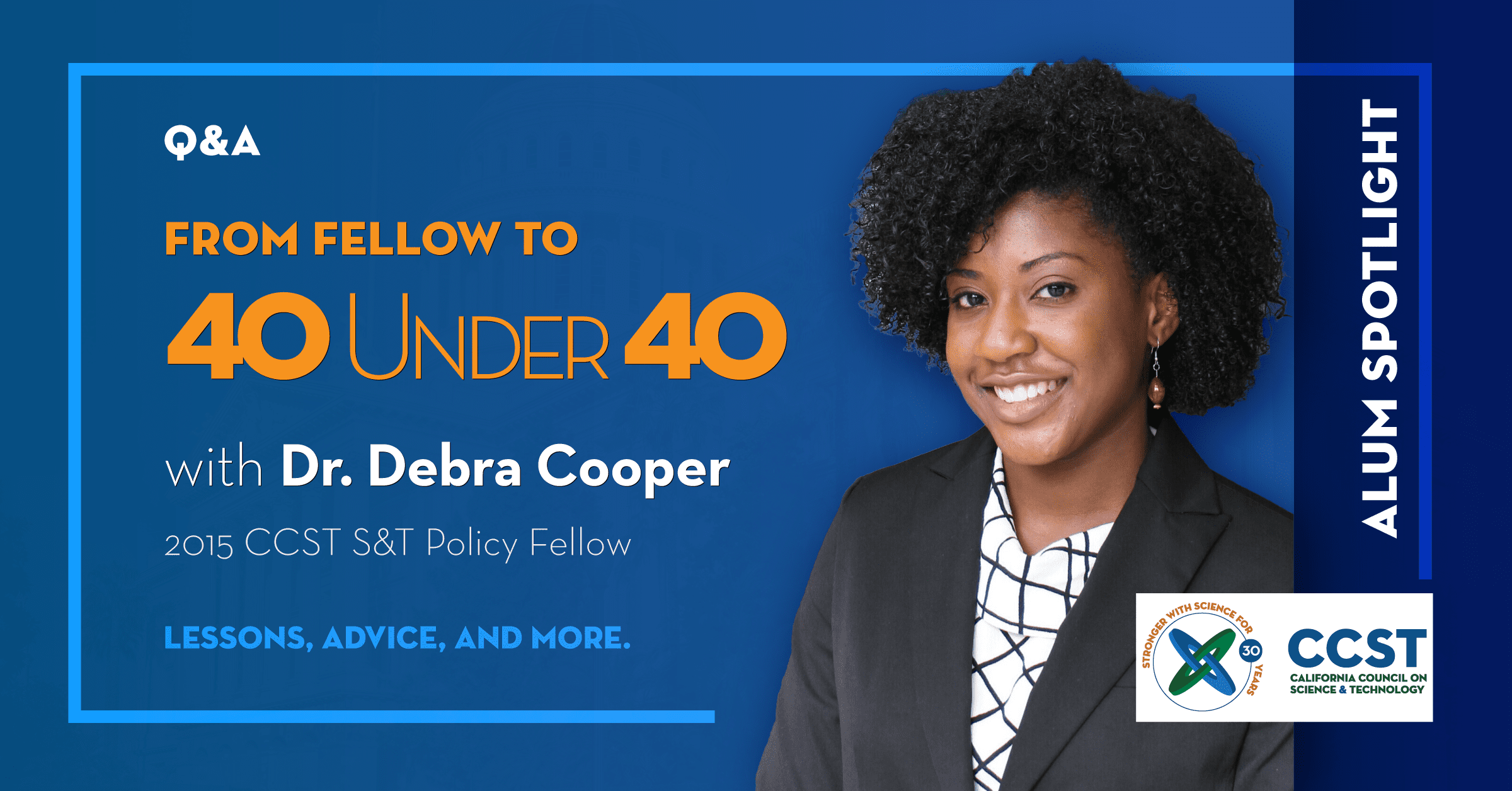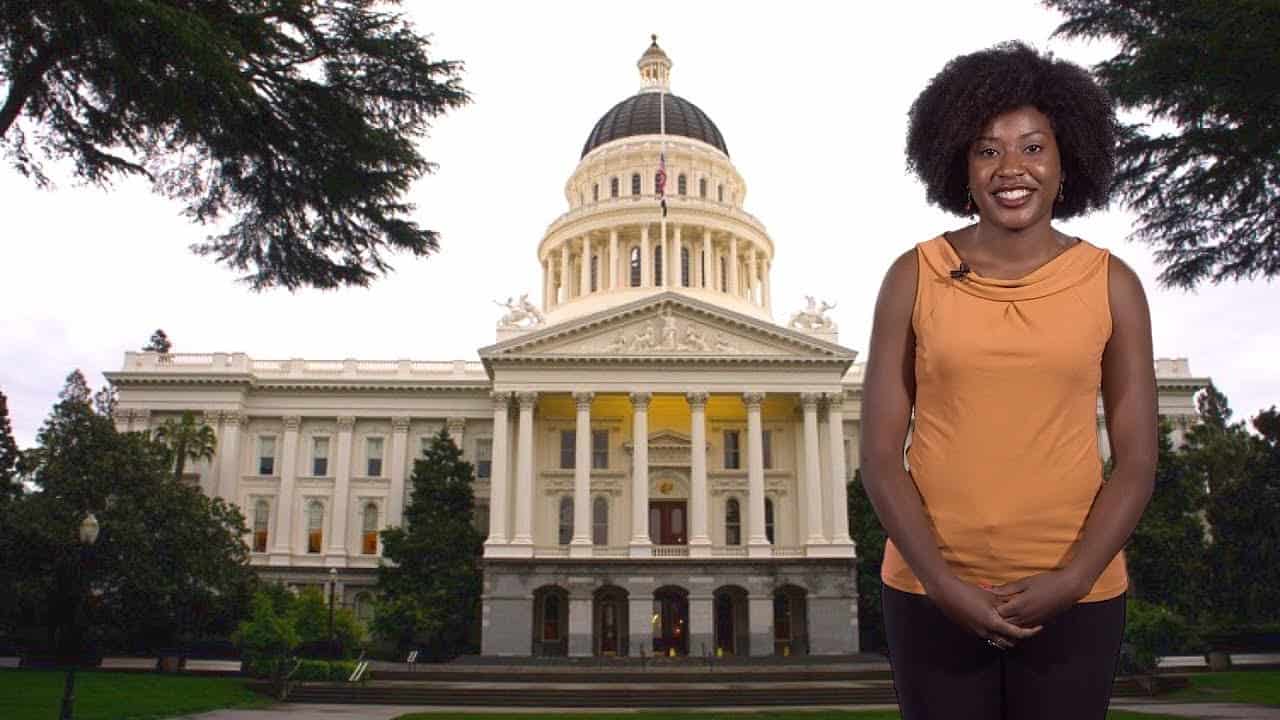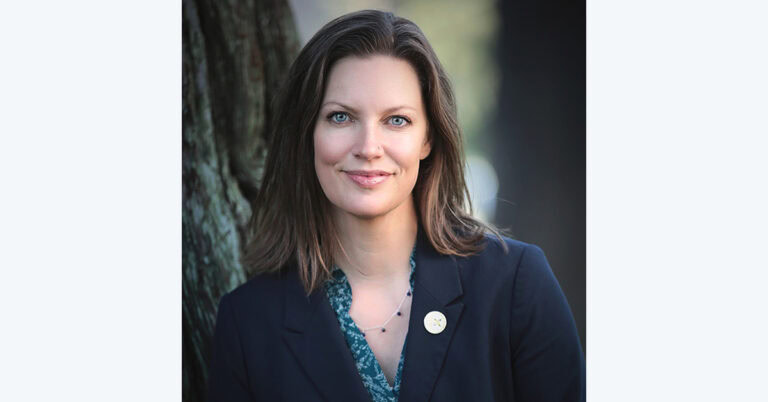Deputy Director
From Fellow to 40 Under 40: Alum Spotlight with Dr. Debra Cooper
December 14, 2021 | CCST Newsroom, CCST S&T Policy Fellows

This fall, 2015 CCST S&T Policy Fellow Debra Cooper, PhD, was recognized as a 40 Under 40 honoree by the Sacramento Business Journal, a highly competitive achievement that recognizes outstanding young professionals. In the SacBiz profile, Debra reflects on her professional accomplishments, lessons learned, and her motivation to inspire Black girls, including her daughter.
As a Fellow, Debra was placed with the California State Senate Office of Research, conducting in-depth research to inform public policy decisions. Now, she is the Chief Consultant of the California State Assembly Human Services Committee, conducting comprehensive analyses of bills affecting childcare, child welfare services, adult protective services, and more. In this position, she plays a key role in finding and developing solutions toward improving the well-being of Californians in need.
Prior to the Fellowship, Debra conducted postdoctoral research at the Center for Addiction Research at the University of Texas Medical Branch in Galveston. She received a PhD in Neuroscience from Emory University and a BS in Psychology from Duke University.
We caught up with Debra as she reflected on this recognition and her public policy career.
Apply: Interested in becoming a CCST S&T Policy Fellow? Applications are open Dec. 1st through March 1st. CCST S&T Policy Fellows Program.
As an accomplished scientist, you decided to make a big career shift into public policy, and now you’ve been recognized as a 40 Under 40 for your career achievements. Congratulations! What drew you to California and how do programs like the CCST S&T Policy Fellowship help make the career transition easier?
I’ve always been somewhat drawn to California. I considered applying to UC Santa Barbara based solely on the images in their brochure, and I always looked forward to when professional societies that I was involved in had meetings in San Diego or Anaheim.
As I was finishing my graduate work, I was confident that I ultimately wanted to transition into science policy, and, at the time, the only way I knew how was through the AAAS Fellowship or the Commissioner’s Fellowship Program. Both my graduate and postdoctoral advisors were supportive of my intended career path, but didn’t have any additional resources to offer me. I ended up Googling and finding the CCST program, which was the best fit for me.
I was fortunate to attend a graduate program that highlighted non-academic career paths, which is how I learned about some science policy opportunities. Despite having the awareness that science policy was a career path that I was interested in, I didn’t know how to transition from pipetting at the bench to writing policy analyses. I didn’t actually know much about what a career in science policy meant in practice, how to pivot to that career, or how to best market myself for a career in science policy. This is where S&T fellowship programs are invaluable. They make the transition from hard science to policy much smoother and manageable and help guide the development of an individual’s career.

Through your teaching and outreach, you’ve no doubt had an impact on the next generation of science policy experts. What piece of advice would you share for a graduate student or postdoc interested in exploring a public policy career?
I’m going to cheat and give two pieces of advice. The first piece of advice is to get involved in policy-making around you. I lived in the capital city of Georgia and next door to the capital city of North Carolina, and never paid close attention to what policies were being made at the state or local level. If I could go back in time, that is one thing that I would change. Being involved can be as little as reading about the policies that are being considered to as big as advocating for or against certain policies. So much happens at the state and local level and it’s crucial to know what is going on around you.
…Get involved in policy-making around you.
The second piece of advice I would give is that all of the skills that you are developing in the lab (or field or whatever the scientific workspace) are transferable skills, and it’s important to start thinking of them that way in order to market yourself. All of those posters that you put together and talks that you gave to your peers? That makes you an excellent communicator. That time you figured out what experiment to do next after your previous experiments gave you bizarre results? That’s an exceptional ability to solve problems. You’re the best in the lab at precise pipetting techniques? That’s a great attention to detail. That period of time when you were completing your experiments, and troubleshooting the undergrad’s experiments, and finishing up a manuscript, and then on top of that, your PI gives you a grant to edit? That means you’re flexible and adaptable and an expert at managing your time. On top of it all, by nature of being in a doctoral program, you’re open-minded and willing to learn.
…All of the skills that you are developing in the lab (or field or whatever the scientific workspace) are transferable skills, and it’s important to start thinking of them that way…
What has been your favorite part of working in public policy? Perhaps something expected, or something unexpected?
My career in the California Legislature has pulled me in several directions that I never could have predicted and I have worked on issues that I never would have imagined working on. I thought I would have no interest working on fiscal analyses, but ended up spending 3.5 years in the Senate Appropriations committee. I’ve worked on policies dealing with veterans affairs and got to visit a nearby armory. I’ve worked on policies that helped with recovery from the devastating wildfires that California has endured in the last several years. I’ve worked on legislation that improved access to services for low-income households. I went on a tour that explored a cannabis nursery, testing facility, and dispensary to show policies in place from the start to finish. And I’ve written memos and reports that focused on laws and regulations on abused substances—directly tying my academic background with my transition into policy. I consider myself a lifelong learner, and working in public policy has definitely kept me learning new things.
You are the Chief Consultant of the California State Assembly Human Services Committee. What exactly is a policy committee? The role of consultants?
Policy committees are one step in the lifecycle of a bill becoming a law. Once an Assemblymember or Senator drafts a bill, that bill gets referred to a policy committee that deals with the issue area germane to that bill. For instance, any bills that would make changes to social services programs, child welfare programs, or developmental services programs, would be referred to my committee—the Assembly Human Services committee. My consultants and I carefully analyze the bill to assess its strengths and weaknesses. If we find weaknesses, we attempt to amend the bill in such a way to address and improve those weaknesses. We write an analysis that is publicly available for the elected members of the committee and the general public to access and read our objective assessment of the bill. The final step for us is to hold a public hearing in which individuals can testify in support or opposition of the bill, and the elected members of the committee vote to pass or not pass the bill out of the committee. If the bill is passed out of our committee, it goes on to the next step in its lifecycle—either another committee or the Assembly floor.
A major aspect of the fellowship for many is uprooting and moving to Sacramento. How did you manage the transition to Sacramento?
I lived in a few states in the south, but never further west than Texas. California was the furthest I’ve lived from my family, and being honest, the highest cost of living of any place I’ve lived. Those were and continue to be the hardest parts of moving out here, but for everything else, once I found my comfort spaces I’ve loved living out here.
The CCST fellowship provided a natural introduction to new people in this new city and state. I also made connections with people in the other capitol fellowship programs and affiliation groups. This jump started meeting other people with similar interests to spend time with outside of work.
Since I was in high school, I have done some level or mentoring or tutoring, and I was missing that in my first few months in Sacramento. I mentioned that to another fellow in my cohort, and she introduced me to her coworker who had started a program called Improve Your Tomorrow (IYT), which is a college preparatory program. I volunteered with IYT for several years before eventually serving on the executive board. I’ve since gotten the bug to serve on a few boards, and am currently serving on the executive board for the California Black Health Network.
I’m an avid reader, and at the end of my first year, I started a monthly book club (Tequila Mockingbird). We’re going 6 years strong, and we have a few CCST alumni among the regulars. I’ve loved connecting with people throughout Sacramento about books that I love (and occasionally books that I dislike).
Sacramento has enough going on to easily find the people and places that bring you comfort and make you happy.
About the CCST Science & Technology Policy Fellowship
The CCST Science & Technology Policy Fellows program trains scientific thinkers to be policy-savvy, while helping equip California’s decision makers with science-savvy staff. The program was established in 2009 with funds from the Gordon and Betty Moore Foundation and other generous friends. Discover how our CCST S&T Policy Fellows make a difference in California’s policy arena and apply at ccst.us/ccst-science-fellows-program.




